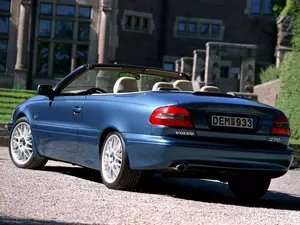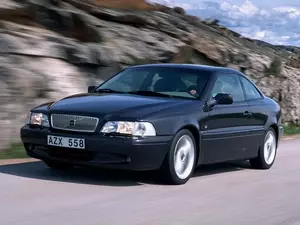
| Vehicle | Precise engine size | Difference from world average | Engine size to consumption ratio | Horsepower from 1 L | Engine size to 100 kg of weight |
|---|---|---|---|---|---|
| 2.O D4 |
1.98 L (1984 cc) |
15.4% smaller | 54 cc to 1 mpg | 89 hp from 1 L | 117 cc to 100 kg |
| 2.O D3 |
1.98 L (1984 cc) |
15.4% smaller | 54 cc to 1 mpg | 76 hp from 1 L | 117 cc to 100 kg |
| 2.4 D5 |
2.4 L (2400 cc) |
2.3% bigger | 67 cc to 1 mpg | 75 hp from 1 L | 141 cc to 100 kg |
| 2.0 D |
2 L (1997 cc) |
14.9% smaller | 54 cc to 1 mpg | 68 hp from 1 L | 133 cc to 100 kg |
| 2.4 i 20V |
2.44 L (2435 cc) |
3.8% bigger | 94 cc to 1 mpg | 57 hp from 1 L | 152 cc to 100 kg |
| 2.5 i 20V |
2.52 L (2521 cc) |
7.5% bigger | 97 cc to 1 mpg | 87 hp from 1 L | 148 cc to 100 kg |
| 2.6 T5 |
2.52 L (2521 cc) |
7.5% bigger | 101 cc to 1 mpg | 91 hp from 1 L | 148 cc to 100 kg |
| Vehicle | 2.O D4 |
|---|---|
| Precise engine size | 1.98 L (1984 cc) |
| Difference from world average | 15.4 smaller |
| Engine size to consumption ratio | 54 cc to 1 mpg |
| Horsepower from 1 L | 89 hp from 1 L |
| Engine size to 100 kg of weight | 117 cc to 100 kg |
| Vehicle | 2.O D3 |
| Precise engine size | 1.98 L (1984 cc) |
| Difference from world average | 15.4 smaller |
| Engine size to consumption ratio | 54 cc to 1 mpg |
| Horsepower from 1 L | 76 hp from 1 L |
| Engine size to 100 kg of weight | 117 cc to 100 kg |
| Vehicle | 2.4 D5 |
| Precise engine size | 2.4 L (2400 cc) |
| Difference from world average | 2.3 bigger |
| Engine size to consumption ratio | 67 cc to 1 mpg |
| Horsepower from 1 L | 75 hp from 1 L |
| Engine size to 100 kg of weight | 141 cc to 100 kg |
| Vehicle | 2.0 D |
| Precise engine size | 2 L (1997 cc) |
| Difference from world average | 14.9 smaller |
| Engine size to consumption ratio | 54 cc to 1 mpg |
| Horsepower from 1 L | 68 hp from 1 L |
| Engine size to 100 kg of weight | 133 cc to 100 kg |
| Vehicle | 2.4 i 20V |
| Precise engine size | 2.44 L (2435 cc) |
| Difference from world average | 3.8 bigger |
| Engine size to consumption ratio | 94 cc to 1 mpg |
| Horsepower from 1 L | 57 hp from 1 L |
| Engine size to 100 kg of weight | 152 cc to 100 kg |
| Vehicle | 2.5 i 20V |
| Precise engine size | 2.52 L (2521 cc) |
| Difference from world average | 7.5 bigger |
| Engine size to consumption ratio | 97 cc to 1 mpg |
| Horsepower from 1 L | 87 hp from 1 L |
| Engine size to 100 kg of weight | 148 cc to 100 kg |
| Vehicle | 2.6 T5 |
| Precise engine size | 2.52 L (2521 cc) |
| Difference from world average | 7.5 bigger |
| Engine size to consumption ratio | 101 cc to 1 mpg |
| Horsepower from 1 L | 91 hp from 1 L |
| Engine size to 100 kg of weight | 148 cc to 100 kg |

| Vehicle | Precise engine size | Difference from world average | Engine size to consumption ratio | Horsepower from 1 L | Engine size to 100 kg of weight |
|---|---|---|---|---|---|
| 2.5 20 V |
2.44 L (2435 cc) |
3.8% bigger | - | 70 hp from 1 L | 152 cc to 100 kg |
| 2.0 20V Turbo |
1.98 L (1984 cc) |
15.4% smaller | - | 114 hp from 1 L | 124 cc to 100 kg |
| 2.0 20V |
1.98 L (1984 cc) |
15.4% smaller | - | 91 hp from 1 L | 124 cc to 100 kg |
| 2.0 i T |
1.98 L (1984 cc) |
15.4% smaller | - | 82 hp from 1 L | 124 cc to 100 kg |
| 2.3 20V T-5 |
2.32 L (2319 cc) |
1.2% smaller | 116 cc to 1 mpg | 103 hp from 1 L | 145 cc to 100 kg |
| 2.3 i 20V T5 |
2.32 L (2319 cc) |
1.2% smaller | - | 106 hp from 1 L | 145 cc to 100 kg |
| 2.4 i 20V |
2.44 L (2435 cc) |
3.8% bigger | - | 82 hp from 1 L | 152 cc to 100 kg |
| 2.5 20V Turbo |
2.44 L (2435 cc) |
3.8% bigger | - | 79 hp from 1 L | 152 cc to 100 kg |
| Vehicle | 2.5 20 V |
|---|---|
| Precise engine size | 2.44 L (2435 cc) |
| Difference from world average | 3.8 bigger |
| Engine size to consumption ratio | - |
| Horsepower from 1 L | 70 hp from 1 L |
| Engine size to 100 kg of weight | 152 cc to 100 kg |
| Vehicle | 2.0 20V Turbo |
| Precise engine size | 1.98 L (1984 cc) |
| Difference from world average | 15.4 smaller |
| Engine size to consumption ratio | - |
| Horsepower from 1 L | 114 hp from 1 L |
| Engine size to 100 kg of weight | 124 cc to 100 kg |
| Vehicle | 2.0 20V |
| Precise engine size | 1.98 L (1984 cc) |
| Difference from world average | 15.4 smaller |
| Engine size to consumption ratio | - |
| Horsepower from 1 L | 91 hp from 1 L |
| Engine size to 100 kg of weight | 124 cc to 100 kg |
| Vehicle | 2.0 i T |
| Precise engine size | 1.98 L (1984 cc) |
| Difference from world average | 15.4 smaller |
| Engine size to consumption ratio | - |
| Horsepower from 1 L | 82 hp from 1 L |
| Engine size to 100 kg of weight | 124 cc to 100 kg |
| Vehicle | 2.3 20V T-5 |
| Precise engine size | 2.32 L (2319 cc) |
| Difference from world average | 1.2 smaller |
| Engine size to consumption ratio | 116 cc to 1 mpg |
| Horsepower from 1 L | 103 hp from 1 L |
| Engine size to 100 kg of weight | 145 cc to 100 kg |
| Vehicle | 2.3 i 20V T5 |
| Precise engine size | 2.32 L (2319 cc) |
| Difference from world average | 1.2 smaller |
| Engine size to consumption ratio | - |
| Horsepower from 1 L | 106 hp from 1 L |
| Engine size to 100 kg of weight | 145 cc to 100 kg |
| Vehicle | 2.4 i 20V |
| Precise engine size | 2.44 L (2435 cc) |
| Difference from world average | 3.8 bigger |
| Engine size to consumption ratio | - |
| Horsepower from 1 L | 82 hp from 1 L |
| Engine size to 100 kg of weight | 152 cc to 100 kg |
| Vehicle | 2.5 20V Turbo |
| Precise engine size | 2.44 L (2435 cc) |
| Difference from world average | 3.8 bigger |
| Engine size to consumption ratio | - |
| Horsepower from 1 L | 79 hp from 1 L |
| Engine size to 100 kg of weight | 152 cc to 100 kg |

| Vehicle | Precise engine size | Difference from world average | Engine size to consumption ratio | Horsepower from 1 L | Engine size to 100 kg of weight |
|---|---|---|---|---|---|
| 2.0 20V Turbo |
1.98 L (1984 cc) |
15.4% smaller | - | 114 hp from 1 L | 132 cc to 100 kg |
| 2.0 20V |
1.98 L (1984 cc) |
15.4% smaller | - | 91 hp from 1 L | 132 cc to 100 kg |
| 2.0 i T |
1.98 L (1984 cc) |
15.4% smaller | - | 82 hp from 1 L | 132 cc to 100 kg |
| 2.3 20V T-5 |
2.32 L (2319 cc) |
1.2% smaller | 97 cc to 1 mpg | 103 hp from 1 L | 155 cc to 100 kg |
| 2.5 20 V |
2.44 L (2435 cc) |
3.8% bigger | - | 70 hp from 1 L | 174 cc to 100 kg |
| 2.5 20V T |
2.44 L (2435 cc) |
3.8% bigger | - | 79 hp from 1 L | 162 cc to 100 kg |
| Vehicle | 2.0 20V Turbo |
|---|---|
| Precise engine size | 1.98 L (1984 cc) |
| Difference from world average | 15.4 smaller |
| Engine size to consumption ratio | - |
| Horsepower from 1 L | 114 hp from 1 L |
| Engine size to 100 kg of weight | 132 cc to 100 kg |
| Vehicle | 2.0 20V |
| Precise engine size | 1.98 L (1984 cc) |
| Difference from world average | 15.4 smaller |
| Engine size to consumption ratio | - |
| Horsepower from 1 L | 91 hp from 1 L |
| Engine size to 100 kg of weight | 132 cc to 100 kg |
| Vehicle | 2.0 i T |
| Precise engine size | 1.98 L (1984 cc) |
| Difference from world average | 15.4 smaller |
| Engine size to consumption ratio | - |
| Horsepower from 1 L | 82 hp from 1 L |
| Engine size to 100 kg of weight | 132 cc to 100 kg |
| Vehicle | 2.3 20V T-5 |
| Precise engine size | 2.32 L (2319 cc) |
| Difference from world average | 1.2 smaller |
| Engine size to consumption ratio | 97 cc to 1 mpg |
| Horsepower from 1 L | 103 hp from 1 L |
| Engine size to 100 kg of weight | 155 cc to 100 kg |
| Vehicle | 2.5 20 V |
| Precise engine size | 2.44 L (2435 cc) |
| Difference from world average | 3.8 bigger |
| Engine size to consumption ratio | - |
| Horsepower from 1 L | 70 hp from 1 L |
| Engine size to 100 kg of weight | 174 cc to 100 kg |
| Vehicle | 2.5 20V T |
| Precise engine size | 2.44 L (2435 cc) |
| Difference from world average | 3.8 bigger |
| Engine size to consumption ratio | - |
| Horsepower from 1 L | 79 hp from 1 L |
| Engine size to 100 kg of weight | 162 cc to 100 kg |